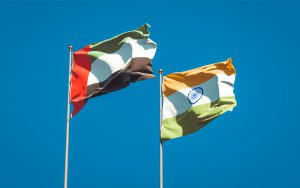ABU DHABI/WAM
Reem bint Ebrahim Al Hashimy, Minister of State for International Cooperation, has said that the UAE-India ties are rooted in affinity, trust and respect.
In an Op-Ed to ‘The Hindu’, an Indian English-language daily newspaper, Al Hashimy said, “Given their long history of connections, the two countries are determined to keep growing and innovating together.”
Following is the full text of Minister Al Hashimy’s Op-ed:
“During the visit of HH Sheikh Khaled bin Mohamed bin Zayed Al Nahyan, Crown Prince of Abu Dhabi, to Delhi this week, there was one engagement that had emblematic significance for him and for the ties between the UAE and India.
Visiting Rajghat, His Highness planted a tree in memory of Mahatma Gandhi, following the example of his father, President His Highness Sheikh Mohamed bin Zayed Al Nahyan, in 2016, and his grandfather, the founding president of our country, Sheikh Zayed, in 1992.
The three trees, planted by three generations of the past, current and future leaders of our country, within the span of three decades, will stand side by side, a symbol of the deeply-rooted and growing ties between our two countries: embedded in the past but reaching towards the future.
At first glance, our countries appear to be very different. India is almost 40 times larger than the UAE in size and is also the most populous country in the world. There are more than 1,000 Indian citizens for every Emirati citizen. Our economies too are founded on different strengths: agriculture is a key pillar of India’s economy, for example, but only makes up less than 1% of the UAE’s GDP.
And while we both emerged as modern nations in the 20th century, our histories and governance are very different. Yet, the strongest ties between nations are those where common interests and values are enriched by complementary strengths and diversity, embracing difference rather than seeking to paper over it.
Deep connections of people and progress
The secret of the success — and distinctiveness — of the UAE-India relationship is the way it is rooted in affinity, trust and respect, derived from generations of human connections. Just as trees depend on strong roots to draw the water and nutrients they need for growth and to hold them fast in tough times, partnerships between nations must have these qualities in order to thrive.
Ours has always been a relationship about people and progress. The first trade links between the Arabian Gulf and India go back thousands of years, as people, goods and ideas crossed back and forth across the ocean. Pottery discovered in recent archaeological excavations in Abu Dhabi shows connections to the Indus Valley civilisations of more than four millennia ago.
In my parents’ time, many Emiratis travelled to India for medical treatment, and when my children catch the typical colds and flu of childhood, I turn to Indian homoeopathic medicine first, before other remedies.
Strength of the expatriate community
The UAE is home to more than 3.5 million Indians, the largest expatriate community in our country. Our success is built on our leaders’ far-sighted commitment to tolerance, inclusion and the empowerment of women and minorities, and we are grateful for the contribution Indian nationals make to the strength and vibrancy of our economy.
The degree of connectivity between our countries can be seen in the simple fact that there are more than 1,500 flights between the UAE and India every single week.
When a relationship is founded on respect and a sincere inclination towards partnership and collaboration, there is no limit to what can be achieved. In February 2022, India became the first country with which the UAE signed a Comprehensive Economic Partnership Agreement. Trade negotiations often take years, if not decades, and are sometimes abandoned due to insurmountable differences.
We were able to agree our partnership agreement within six months, because of the trust and affinity at the heart of our relationship. In its first year of operation, our bilateral trade jumped by over 15%. We have signed billions of rupees of additional investment deals and plan to go much further.
Sheikh Khaled recently attended the inauguration of the Indian Institute of Technology Delhi Abu Dhabi, which is the first overseas branch of the prestigious university. We have exchanged agreements on topics including health innovation and renewable energy, crucial to our nations’ and the world’s future.
During the Crown Prince’s visit, further cooperation agreements will be signed, including on civil nuclear technology: a domestic success story for the Emirates, but one rooted in international cooperation.
India’s research into nuclear desalination to produce clean drinking water —which has obvious importance for a desert country such as the UAE — is one example of the many opportunities which our partnership can enable advances not just in green energy production but also in medical technology, scientific research, agriculture and industry.
Ties that will flourish
Like his grandfather, Sheikh Khaled planted an amaltas tree, Cassia fistula. His father, Sheikh Mohamed bin Zayed, planted the moulsari tree (Mimusops elengi). Amaltas trees grow fast, embodying opportunity and renewal, while the slower-growing moulsari points us to the virtues of stability and patient trust. As the UAE and India continue to develop our comprehensive strategic partnership, these different qualities symbolise our approach.
We can have confidence in our mutual affinity and respect and our long history of connection, but also be determined to keep growing and innovating together, renewing our partnership and finding new ways to flourish.”
 The Gulf Time Newspaper One of the finest business newspapers in the UAE brought to you by our professional writers and editors.
The Gulf Time Newspaper One of the finest business newspapers in the UAE brought to you by our professional writers and editors.
